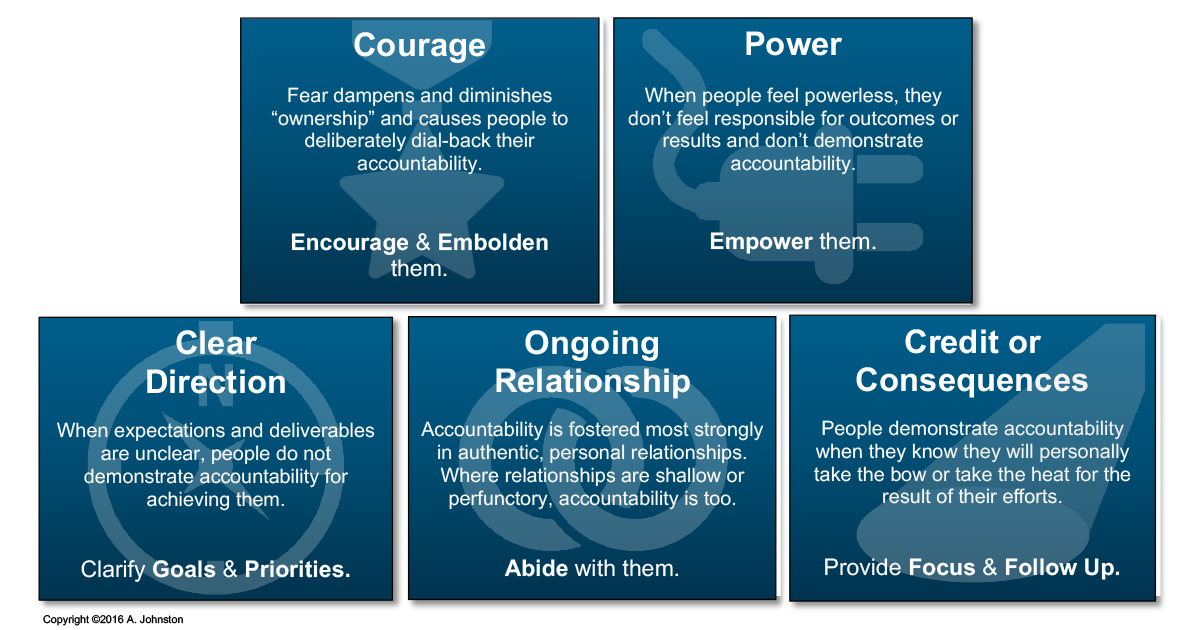Turning Up the Commitment of Your Team
Accountability is a hot topic these days. It comes up in almost every context and organization I work with because teams always long for leaders who will own their actions, and leaders are always looking for higher engagement from their teams. What they both want is greater accountability. They know that people who feel accountable take more ownership of the mission and demonstrate deeper commitment, greater resilience, higher initiative, and better contributions. People who don’t feel accountable dodge ownership and bog things down, or back them up. They do things halfway, or simply fail to finish what they start.
How does the Bible illustrate accountability…..
Jesus illustrated this difference when he was debating the Pharisees in John 10. (Apparently accountability has always been a hot topic!) He told the Pharisees that a good shepherd will go so far as to give his life for the sheep, but a hired hand will run away and leave the sheep to fend for themselves if he sees a wolf coming. He’ll cut and run at the first sign of trouble because he thinks like a hired hand instead of an owner and he lacks the sense of accountability that would make him stay.
In 1 Samuel 17 you get a picture of what a shepherd would look like if he actually had that sense. The picture is of David. Not King David at this point, but wiry, young Boy David, and he’s trying to convince Saul that he’s ready to take on Goliath with no armor, and no sword. Saul, of course, tries to talk him out of it by reminding him that he’s just a puny kid and Goliath is a walking War Machine, but David is undeterred. When he responds, he doesn’t sound like the kind of guy who bails when things get tough. He tells Saul, “I used to keep sheep for my father. And when there came a lion, or a bear, and took a lamb from the flock, I went after him and struck him and delivered it out of his mouth. And if he turned on me, I caught him by his beard and struck him and killed him. I’ve struck down both lions and bears, and this uncircumcised Philistine will be like one of them, for he has defied the armies of the living God.” That’s not the voice or the attitude of a hired hand; it’s too full of personal commitment and initiative. That’s accountability.
People who feel accountable take more ownership of the mission and demonstrate deeper commitment
Ultimately accountability doesn’t just make the difference between owners and hired hands. It distinguishes any man or woman who is personally invested in the mission and will do whatever it takes to get the job done. Accountability is what moves them to make meaningful commitments to goals and expectations in process and take personal responsibility for results and implications after the fact.
Naturally leaders want to foster this attitude in their team members, but I find that their efforts are often misguided. They think accountability is fostered best in in difficult conversations that call out individuals’ failures or insufficiencies. So, they orchestrate myriad hit-and-run moments-of-reckoning they hope will elevate the commitment level of their people. This tactic is not only unpleasant, it’s counterproductive. It traps leaders in a vicious cycle where they are damaging the very sense of accountability they’re trying to foster and causing their people to step back instead of step up.
Accountability must be cultivated rather than commanded
The secret to avoiding this trap and building the commitment you want in your team is to remember that accountability is not something you do to your people. It is something they must do for themselves. Accountability is ultimately about a person’s willingness to account for his or her own actions. So, it’s a choice they make of their own volition. That means that accountability must be cultivated rather than commanded. It also means that if you want to increase it in your team members, your job isn’t to police their performance as much as it is to create the kind of culture and conditions that will lead them to make that choice again and again.
To help you in this, I’ve identified Five Foundations of Accountability:
Turning Up the Commitment of Your Team
Accountability is a hot topic these days. It comes up in almost every context and organization I work with because teams always long for leaders who will own their actions, and leaders are always looking for higher engagement from their teams. What they both want is greater accountability. They know that people who feel accountable take more ownership of the mission and demonstrate deeper commitment, greater resilience, higher initiative, and better contributions. People who don’t feel accountable dodge ownership and bog things down, or back them up. They do things halfway, or simply fail to finish what they start.
How does the Bible illustrate accountability…..
Jesus illustrated this difference when he was debating the Pharisees in John 10. (Apparently accountability has always been a hot topic!) He told the Pharisees that a good shepherd will go so far as to give his life for the sheep, but a hired hand will run away and leave the sheep to fend for themselves if he sees a wolf coming. He’ll cut and run at the first sign of trouble because he thinks like a hired hand instead of an owner and he lacks the sense of accountability that would make him stay.
In 1 Samuel 17 you get a picture of what a shepherd would look like if he actually had that sense. The picture is of David. Not King David at this point, but wiry, young Boy David, and he’s trying to convince Saul that he’s ready to take on Goliath with no armor, and no sword. Saul, of course, tries to talk him out of it by reminding him that he’s just a puny kid and Goliath is a walking War Machine, but David is undeterred. When he responds, he doesn’t sound like the kind of guy who bails when things get tough. He tells Saul, “I used to keep sheep for my father. And when there came a lion, or a bear, and took a lamb from the flock, I went after him and struck him and delivered it out of his mouth. And if he turned on me, I caught him by his beard and struck him and killed him. I’ve struck down both lions and bears, and this uncircumcised Philistine will be like one of them, for he has defied the armies of the living God.” That’s not the voice or the attitude of a hired hand; it’s too full of personal commitment and initiative. That’s accountability.
People who feel accountable take more ownership of the mission and demonstrate deeper commitment
Ultimately accountability doesn’t just make the difference between owners and hired hands. It distinguishes any man or woman who is personally invested in the mission and will do whatever it takes to get the job done. Accountability is what moves them to make meaningful commitments to goals and expectations in process and take personal responsibility for results and implications after the fact.
Naturally leaders want to foster this attitude in their team members, but I find that their efforts are often misguided. They think accountability is fostered best in in difficult conversations that call out individuals’ failures or insufficiencies. So, they orchestrate myriad hit-and-run moments-of-reckoning they hope will elevate the commitment level of their people. This tactic is not only unpleasant, it’s counterproductive. It traps leaders in a vicious cycle where they are damaging the very sense of accountability they’re trying to foster and causing their people to step back instead of step up.
Accountability must be cultivated rather than commanded
The secret to avoiding this trap and building the commitment you want in your team is to remember that accountability is not something you do to your people. It is something they must do for themselves. Accountability is ultimately about a person’s willingness to account for his or her own actions. So, it’s a choice they make of their own volition. That means that accountability must be cultivated rather than commanded. It also means that if you want to increase it in your team members, your job isn’t to police their performance as much as it is to create the kind of culture and conditions that will lead them to make that choice again and again.
To help you in this, I’ve identified Five Foundations of Accountability:

These building blocks identify the leadership practices and priorities that can transform the initiative and engagement of your team. If you are successful in addressing them, you’ll find that your people step up their commitment and demonstrate the accountability you need. Similarly, if accountability is scarce and you feel like you have more than your share of hired hands, it’s likely one or more of these foundations is missing in your team’s experience.
If you are looking to go deeper in your leadership of creatives check out Dr. Andrew Johnston’s book, Fired Up: Kindling and Keeping the Spark in Creative Teams


